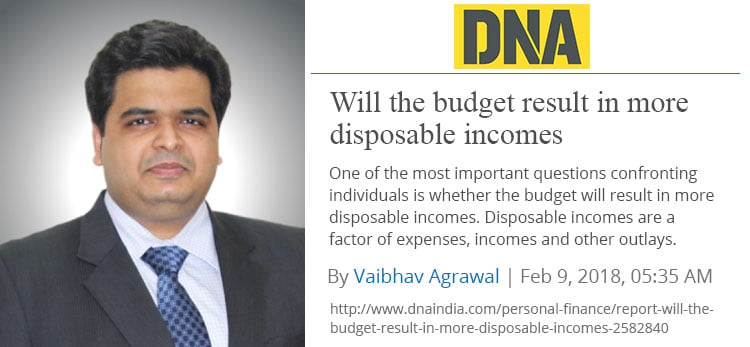One of the most important questions confronting individuals is whether the budget will result in more disposable incomes. Disposable incomes are a factor of expenses, incomes and other outlays. Let us look at a few pointers…
Will the budget improve disposable incomes for individuals?
- The salary slabs have been largely kept neutral for tax purposes. The downside is that the cess has been increased from 3% to 4%, where the impact will be minimal in case of lower and middle income groups. Otherwise the tax slabs have all been kept at the existing levels only.
- The budget has reintroduced standard deduction of Rs.40,000 per annum across all income categories. This is likely to provide some relief for the salaried individuals. However, this will be compensated by the abolition of transport allowance and medical reimbursement. This will solve a lot of procedural hassles for the individuals and will not require too much of documentation.
- The tax on capital gains above Rs.1 lakh at 10% could be slightly tricky. This may force many investors to adopt a slightly longer term approach or possibly split their gains across two fiscal years. However, if you are sitting on capital gains then you have time till March 31st this year to book y our capital gains without incurring any tax liability. That may be a good idea for those who are looking at liquidity.
- The introduction of dividend distribution tax may not be too conducive for mutual fund holders, especially in the dividend plans. This is more in case of individuals who are relying on regular dividend flows from funds. Now the DDT on equity fund dividends will be levied at 10% and to that extent will reduce your inflows. That needs to be planned accordingly.
- Inflation could be the big worry for your disposable income. The higher fiscal deficit will mean less disposable income in real terms. After all, what matters is the return you earn post inflation. Also if you are planning for the long term then you need to increase your outlays towards your goals accordingly, leading to lesser disposable incomes.
- If you are heavy on debt funds, then this budget may have some negative news for you. With interest rates and yields likely to go marginally higher, returns on debt funds could be negatively impacted. If you are relying on debt funds for safety and returns then you need to factor this into your calculations of disposable income
- Be a little cautious on the expenditure side, especially if you are talking about imported goods. Today a lot of the apparel we wear, perfumes we apply and the electronic gadgets we use are all imported. This budget imposes a 10% Social Welfare Surcharge on all imports and has also hiked the import duty on most imported products. This is likely to leave you with less disposable income in your hand.
- The disposable income for senior citizens is likely to get better because of the budget. The tax free interest limit on bank deposits has been raised from Rs.10,000 to Rs.50,000. Also there will be no TDS so better liquidity management if you are a senior citizen.
Overall the budget is likely to be neutral for disposable incomes.

